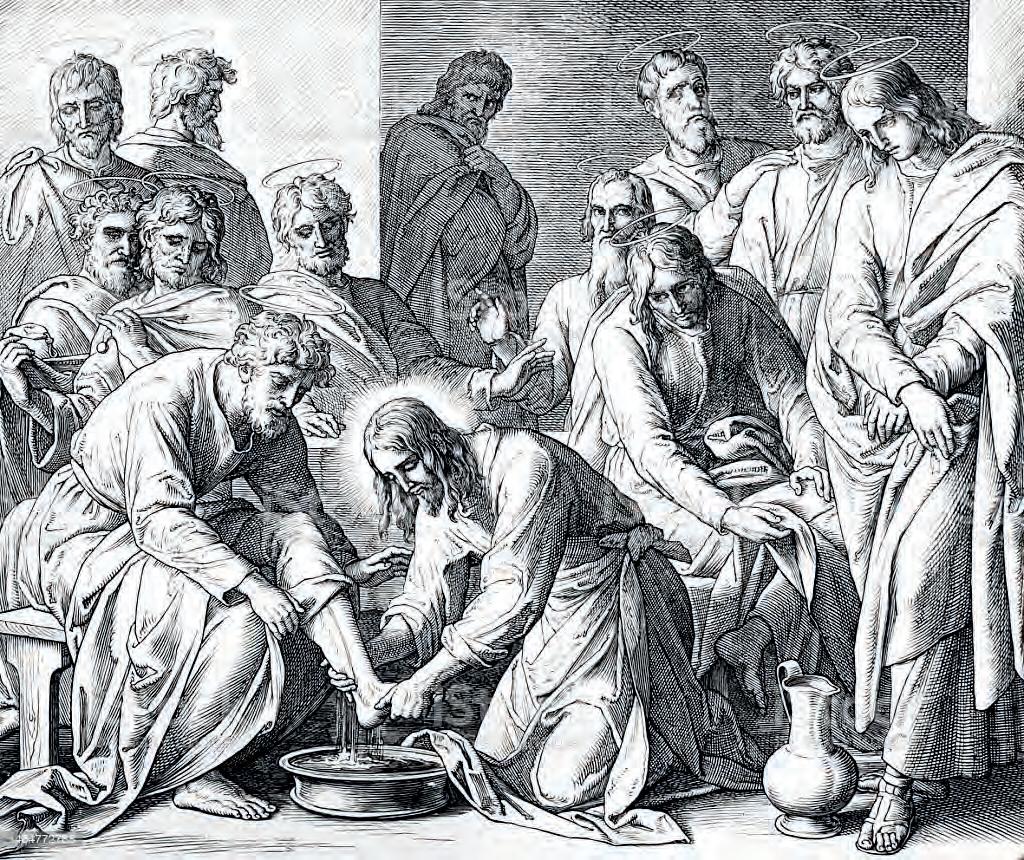
4 minute read
MAKE YOUR WAY to the Lowest Place
By Daniel Kwok KMG (Ob)
At the Last Supper, one of Jesus’ final instructions to His apostles, and to us, is this: “If I, then, the Lord and Master, have washed your feet, you must wash each other’s feet. I have given you an example so that you may copy what I have done to you” (Jn 13:14-15).
Separately, in a parable, He instructed similarly: “Make your way to the lowest place” (Lk 14:10). Humility is a subject that several of our chaplains advocate we reflect upon in the Order. You might ponder on why they comment so. Humility is an elusive virtue. Pride, egoism, and selfpreference are natural human conditions, and they rob us of peace, both interiorly and with one another.
The thoughts, words and actions they stir are often believed as right and defendable. But they leave us agitated. Jesus expressly asks us to follow Him and learn from Him for He is “meek and humble of heart”. We must. Only then He will give us “rest” (cf. Mt 11:29), the peace that only He can give.
A suggestion for feet washing at one of our retreats was turned down with the sad reason: “We are not ready for that”. Understandably, much to transcend before cringe can be overcome. Boardroom dynamics sometimes make their way into the Order, toxifying relationships and diminishing its service to the poor and the sick. Conversations are combats for selfassertion and self-referencing as though airtime is more important than air.
When we say the Order’s prayer daily, we ask for God’s grace to be “forgetful of myself”. We are really praying to put self aside, attending only to the good of others. To be detached from our self-importance, our opinions, our eminence. Franciscan spiritual writer, Fr Richard Rohr, terms one of his five hard truths bluntly as: “You are not all that important.”
We are, after all, merely instruments for
God to do His work. St Bernadette is often quoted: “The Blessed Virgin used me like a broom. What do you do with a broom when you have finished sweeping? You put it back in its place, behind the door!”
Jesus, our incarnated God and Creator, “emptied himself, taking the form of a slave… humbled himself and became obedient to the point of death – even death on a cross” (Ph 2:7-8). Whatever lowliness we assume cannot be lower than the perfect model. Indeed, without imitating “our highest teacher and lawgiver, Jesus Christ… no amount of study of Sacred Scripture or theology, nor any efforts at good works are able to achieve anything lasting. In vain are all our labour unless they are accompanied by humility,” writes Thomas à Kempis.
French Jesuit theologian Fr Leonce de Grandmaison helps us to contemplate further: “Jesus served his brothers in humility, as a slave, a servant… without preference: Peter, John, Judas... Without demanding any reward. In the spirit of love and total dedication, seeing God His Father in them. He said, ‘I will serve!’, and thus closed and healed the great wound from which the lifeblood of humanity flows, the wound of pride, independence, egoism, selfdetermination, living for self.”
Do we serve without preference? Are we happy to work with anyone, whatever the chemistry or history? Do we serve with all our heart? We must not forget that in the Order, “we love the same master, we are labouring at the same task, we share the same treasure”.
Our Lady saw only her lowliness when she obediently said “yes” to Our Lord. St John the Baptist also knew lowliness when he announced that he must decrease for Jesus to increase. What humility to relinquish the following of thousands, pointing them away from him and to the Lamb of God. (cf. Lk 1:48, Jn 1:29)
Still, the fire of pride can easily be sparked. St Jose Maria Escriva identifies a condition common to humans young and old everywhere. There is “an almost sickly touchiness that takes offence at words and actions that are in no way meant to be insulting.” Bitterness simmers. Heated words leave our mouth. Scores are kept. Yet, the saints tell us that humiliations are means to humility.
Only with the divine assistance and grace of God can we overcome pride, the cause of humanity’s first sin, and to which we are all most prone to. Perhaps we can start by praying daily a prayer that some members are already familiar with – The Litany of Humility – composed by Rafael Cardinal Merry de Val (18651930), the Secretary of State under Pope Saint Pius X (1865-1930). The litany lists in the first part the many facets of pride – the sweetness of vainglory, the pain of injury to tightly held egos – and in the second part examples of generosity that accompany humility. In the third and final part, the litany circles back to the perfect humility of Our Lord Jesus and whose help we need to “follow Him”.
The Litany Of Humility

O Jesus! meek and humble of heart, Hear me. From the desire of being esteemed, Deliver me, Jesus. (Repeat after each line) From the desire of being loved, From the desire of being extolled, From the desire of being honoured, From the desire of being praised, From the desire of being preferred to others, From the desire of being consulted, From the desire of being approved, From the fear of being humiliated, From the fear of being despised, From the fear of suffering rebukes, From the fear of being calumniated, From the fear of being forgotten, From the fear of being ridiculed, From the fear of being wronged, From the fear of being suspected,
That others may be loved more than I. Jesus, grant me the grace to desire it. (Repeat after each line) That others may be esteemed more than I, That, in the opinion of the world, others may increase, and I may decrease, That others may be chosen, and I set aside, That others may be praised and I unnoticed, That others may be preferred to me in everything, That others may become holier than I, provided that I may become as holy as I should.
Lord Jesus, though you were God, you humbled yourself to the extreme of dying on a cross, to set an enduring example to the shame of my arrogance and vanity.
Help me to learn your example and put into practice so that, by humbling myself in accordance with my lowliness here on earth, you can lift me up to rejoice in you forever in heaven. Amen










